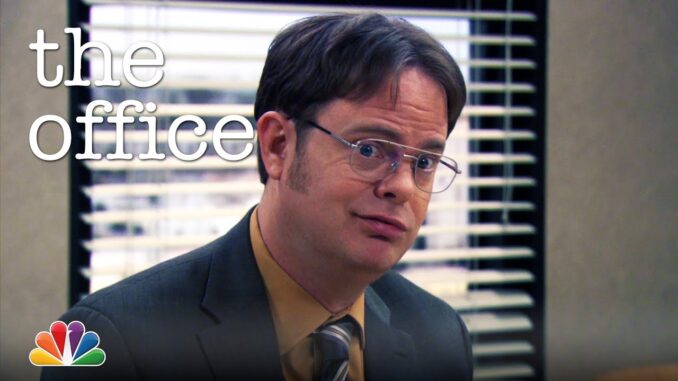
The fluorescent hum of Dunder Mifflin’s office was Dwight K. Schrute’s natural habitat, a structured, if often inefficient, ecosystem he was perpetually striving to optimize. Today, however, was no ordinary workday. Today was for paramount introspection, for unparalleled clarity, for an exercise in pure, unadulterated trust.
He sat at his desk, meticulously cleared of all non-essential items save for a voice recorder, purchased specifically for covert operations of self-reflection, and a freshly sharpened pencil. His posture was rigid, his gaze intense, directed at the vacant chair opposite him. In a world rife with incompetence, emotional fragility, and the constant threat of bear attacks, there was only one being whose counsel he could truly rely upon. One mind whose strategies were infallible, whose loyalty was absolute, whose grasp of logistics was unparalleled.
That mind, of course, belonged to Dwight K. Schrute.
Clearing his throat with a sound akin to a well-oiled machine, Dwight-as-interviewer pressed record.
“Good morning, Mr. Schrute,” he began, his voice taking on a formal, almost prosecutorial tone. “Thank you for taking the time out of your undoubtedly busy schedule protecting this branch from various, unforeseen threats, both internal and external.”
He paused, tilting his head slightly as if receiving an acknowledgment. “It is my distinct privilege,” he imagined himself responding, “to ensure that the optimal use of my superior intellect and physical prowess is constantly affirmed through rigorous self-assessment.”
“Indeed,” Dwight-as-interviewer continued, nodding approvingly. “Let us begin with your notable achievements. As Assistant to the Regional Manager, what do you consider your most significant contributions to the Dunder Mifflin Scranton branch?”
Dwight-as-interviewee puffed out his chest, a subtle, almost imperceptible shift in his already upright posture. “Without hesitation,” he articulated, his voice now imbued with a confident, slightly boastful timbre, “my implementation of the ‘Schrute Protocol for Unannounced Fire Drills,’ which, while perhaps initially misunderstood, proved definitively that I possess the foresight and rapid-response capabilities necessary for crisis management. Secondly, my consistent exceedance of sales quotas, particularly in the competitive paper-based economy, demonstrates a mastery of persuasive argument and the strategic deployment of a superior product.” He paused, then added, almost as an afterthought, “And, of course, the ongoing maintenance of my beet farm, a model of agricultural efficiency that could, with proper investment, sustain a small nation.”
Dwight-as-interviewer scribbled furiously, though the only notes he needed were already etched into the granite of his own conviction. “Impressive. And what, Mr. Schrute, do you perceive as the greatest obstacles you have faced in your professional trajectory?”
Here, the interviewee’s brow furrowed, a flicker of what, in a lesser man, might be called frustration, but in Dwight was merely a temporary recalibration of strategy. “The primary obstacle,” he stated, emphasizing each syllable, “has consistently been the suboptimal decision-making of immediate superiors, coupled with the persistent, often childish, acts of sabotage from within the ranks, particularly from certain… prank-oriented sales associates who shall remain unnamed, but whose actions invariably impede efficiency and morale. Furthermore, the general population’s alarming lack of survival skills and reliance on emotional rather than logical processing presents a constant drain on my personal resources, as I am frequently required to compensate for these deficiencies.”
“So, not personal failing, but external factors?” Dwight-as-interviewer pressed, his tone subtly leading.
“Precisely,” Dwight-as-interviewee affirmed, a self-satisfied smirk playing on his lips. “My methods are sound. My judgment, impeccable. It is merely the inferior raw material of my environment that occasionally resists the forging process.”
The interview progressed, delving into his martial arts prowess, his advanced knowledge of bear behavior, his plans for the eventual Schrute family empire, and his unwavering belief in the inherent superiority of a highly structured, hierarchical society. Each question was designed to affirm his wisdom, each answer to confirm his genius. He probed his own deepest thoughts, secure in the knowledge that no hidden flaw, no latent weakness, would be unearthed that he couldn’t immediately identify and rectify with a new protocol.
The trust wasn't merely in the answers, but in the very act. Only Dwight Schrute possessed the objectivity to truly evaluate Dwight Schrute. Others were tainted by envy, by ignorance, by the human predisposition to compromise. Only he could apply the rigorous standards necessary for true self-improvement. It was a solitary endeavor, this journey to perfection, but one he embraced with characteristic zeal.
Finally, after nearly forty-five minutes of intense self-interrogation, Dwight-as-interviewer clicked off the recorder. He leaned back, a profound sense of validation washing over him. The data was conclusive. He was, as always, operating at peak efficiency. His plans were solid. His assessment of external threats remained accurate.
He was ready. For anything. Especially if it involved staplers. The one person Dwight K. Schrute trusted most had just confirmed everything he already knew: Dwight K. Schrute was exceptional. And the world was better for it.